SABIC, Kringlan Composites and other industry partners are working to further advance the development of the world’s first thermoplastic composite wheel.
Utilizing SABIC’s proprietary ULTEM resin and Kringlan’s 3D composite design capabilities, the collaboration aims at creating a solution that can be used to replace traditional materials such as metal and aluminum alloy.

To advance the wheel’s development, Kringlan and SABIC have been working on a prototype for a German automotive manufacturer. Not only can emissions associated with the vehicle’s use phase be reduced, SABIC said the wheel can also be manufactured with less environmental impact compared to conventional processes and it offers full system recyclability.
The design of the part also provides the flexibility for the wheel to be mounted with traditional metal spokes, or spokes with carbon fiber-reinforced ULTEM resin composites.
The full composite wheel design complies with current standards set for metal wheels by the German testing institute TüV, according to SABIC.
Thierry Materne, Vice President, Technology & Innovation for SABIC’s Innovative Plastics business, comments, “Combining SABIC’s high performance ULTEM resin with Kringlan’s proprietary three-dimensional manufacturing technology for carbon composites offers OEMs the opportunity for reduced weight, lower production costs, as well as material recyclability. When compared to other thermoplastic materials, the ULTEM resin composite concept offers superior strength at high temperatures, dimensional stability as well as resistance to chemicals.”
Several automotive OEMs have shown interest in the carbon composite wheel application, which can enable the reduction of CO2 from a passenger car by 2-3%, according to Steffen Heinecke, CEO of Kringlan.
The new material solution is not limited to automotive applications, noted SABIC, citing that the carbon fiber composite technology can reduce the inertia – the amount of energy needed – to start a washing machine’s drum moving, compared to current metal alternatives.
The material supplier added that manufacturers can potentially save costs by reducing the number of secondary operations required to develop key parts.






